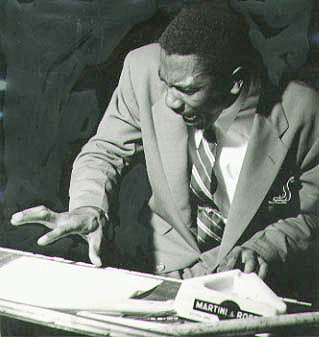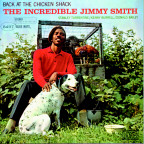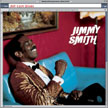

Courtesy of Jimmy Smith

Blue Note Records

Verve Records
A FIRESIDE
CHAT WITH JIMMY SMITH
Can
you imagine the organ trio without Jimmy Smith? I can't. He brought the
organ out of the clubs and into the mainstream
and with his numerous monumental recordings on Blue Note, Smith is indeed
The Champ. I sat down with The Champ, who still tours rigorously, as always,
unedited and in his own words.
FRED
JUNG: Let's start from the beginning.
JIMMY
SMITH: I heard Mr. Wild Bill Davis. I heard him play in 1930 and he told
me that it would take me fifteen years just to learn the pedals, the pedals
of the organ and I got mad. I got madder than a mother fucker. I learned
in three months. Three months. I was playing the organ for three months.
It was a challenge for me in the beginning. And what I did, the way I
did it, I had a guy put a three foot by three foot base so I wouldn't
have to look down at the pedals. Most people had to look down at what
they're hittin'. Well, shit, I had them make me a three foot by three
foot chart and what is the way I learned how to play the pedals. And then
when I found my sound, it took me two and a half weeks to find my sound
and when I did I pulled out all the stops, all the stops I could find.
It was a three foot stop on the organ. That is how I found my sound, the
Jimmy Smith sound.
FJ:
It almost seems like you were predestined to play the organ?
JIMMY
SMITH: Oh, yeah.
FJ:
Influences?
JIMMY
SMITH: Davis was playing. Milt Buckner. You know, old guys. And Milt Buckner
used to play with Lionel Hampton. That's years ago now. So I learned from
these old guys.
FJ:
Let's touch on your tenure with Blue Note and your relationship with its
founder, Alfred Lion.
JIMMY
SMITH: I was his lover. Did you hear what I said? I was his lover. Him
and Frank, we were lovers. You see, Fred, we got married. It was a marriage.
We had a marriage and I am sorry that he died. My first recording, a guy
came down to Philadelphia and heard me play and he introduced me to Alfred
Lion. I did my first recording. It was called The Champ. From then on,
we just went ahead with The Sermon, Midnight Special, and all that shit.
FJ:
You can build a shrine around The Sermon.
JIMMY
SMITH: It is a classic! That is what I tell you boy. Lee (Morgan) played
with Dizzy. He was about seventeen or eighteen years old. He was playing
then. He was the bitch then. Alfred Lion got him. He got Hank Mobley.
Who else is on there?
FJ:
Tina Brooks.
JIMMY
SMITH: Tina Brooks, yeah. How did you know that shit?
FJ:
I love your shit.
JIMMY
SMITH: (Laughing) Woo, shit! Woo, shit! They were the bad guys. Art Blakey.
They were the monsters.
FJ:
Home Cookin', Crazy! Baby, Back at the Chicken Shack, and Midnight Special,
are classic Blue Note album covers.
JIMMY
SMITH: Oh, yeah. Frank did all that. Frank Wolff.
FJ:
The crux of your body of work has been in the context of the organ trio
(organ, guitar, drums).
JIMMY
SMITH: It just linked, Fred. It just linked. The sound, it just linked.
I liked trio. I liked big band now, big band is better. Oliver Nelson,
Thad Jones, and Lalo Schifrin. Now you're talking. So all these big bands
were all right, but trio sounds the best. People like the idea of the
trio and so I did mostly trio.
FJ:
Let's talk about your collaborations with Wes Montgomery.
JIMMY
SMITH: I met him in the Sixties. Man, shit, I am going to tell you something.
We walked into the studio and we hit it right off. Hit it. Bam. Hit it.
Just like that. I miss him.
FJ:
What is soul jazz?
JIMMY
SMITH: That is what it is. What else can you say? It is smoking. It stinks.
It is rancor. It is rancor. It stinks. It is some stinking shit (laughing).
FJ:
Down and dirty.
JIMMY
SMITH: Oh, shit. People love it. People love it.
FJ:
Music transcends color lines.
JIMMY
SMITH: Hell, yeah. Ninety-five percent of my audience was white. All the
colleges I played, most of the colleges, they were white.
FJ:
Times haven't changed much.
JIMMY
SMITH: Yeah, it is about the same. I have a different audience though.
They are young, very young and they are playing organ too. I just came
from Aspen, Colorado and they had fifteen kids I played for and they all
played horns. They went crazy, Fred. They went crazy.
FJ:
What is your secret?
JIMMY
SMITH: No secret, I just like to play (laughing). Ain't no secret. Just
play.
FJ:
Are you Superman?
JIMMY
SMITH: (Laughing) Yeah, there ain't no secret.
FJ:
Let's touch on your soon to be released album on Verve.
JIMMY
SMITH: Look at who is on that now. Dr. John, B.B. King, Etta James, Keb
Mo, shit, all bad people. Everybody played good. You have got to hear
this damn album. It's the bitch. It is the bitch buddy. It is wonderful.
FJ:
What are your listening pleasures these days?
JIMMY
SMITH: Me (laughing). Like Sermon, Chicken Shack, Who's Afraid of Virginia
Woolf, Walk on the Wild Side, and the stuff I did with Wes.
FJ:
Are you still keeping a rigorous touring schedule?
JIMMY
SMITH: Not that much. I just came back from Germany. It gets tiresome.
It gets tiresome. It is long rides. Long rides. Other than that, it is
all right. I love it. I'm going to Chicago for the festival and then I
will be at the Hollywood Bowl.
FJ:
You are The Champ.
JIMMY
SMITH: That's right. The monster. A bitch (laughing). I'm telling you
man.
FJ:
Anything left to prove?
JIMMY
SMITH: No, not really.
FJ:
Sounds like the road has been a good one for Jimmy Smith.
JIMMY
SMITH: Yeah, it has. Once and a while you get tired.
Fred
Jung is Jazz Weekly's Editor-In-Chief and likes his steaks rare. Comments?
Email
Fred.